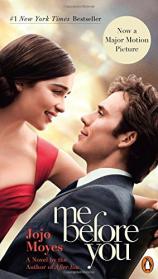Author Talk: August 2, 2013
Jojo Moyes's ME BEFORE YOU, which was a huge hit when it released last New Year's Eve in hardcover, is now available in paperback. The novel follows Louisa Clark, who takes a badly needed job working for ex-Master of the Universe Will Traynor --- wheelchair-bound and having a hard time adjusting to his new life. In this interview, Moyes talks about the very real and tragic news story that inspired the book, as well as the personal experiences that led her to it. She also discusses her fascination with the love-hate bond between siblings, which allowed her to write so compellingly about the relationship between Louisa and her sister, Treena. Lastly, Moyes tentatively weighs in on the re-heated debate about whether or not having children is essential to understanding the human condition, and how achieving broader commercial success has changed her writing process --- for better or for worse.
Question: What was the inspiration behind ME BEFORE YOU?
Jojo Moyes: It was a number of things. I had two close relatives who were dependent on 24-hour care, and the issue of quality of life and how we behave around the severely disabled was high in my mind. But the novel was really spurred by a news story I heard about a young rugby player who was left quadriplegic after an accident and who persuaded his parents to take him to Dignitas, the Swiss clinic, to allow him to go through with an assisted suicide. I couldn’t believe any parent would agree to do that --- and yet, the more I read up on his story, the more I realized the issue was not as clear-cut as I would have liked to believe.
Q: With Louisa and Treena, you perfectly captured the love-hate relationship that sisters often share. Do you have sisters yourself?
JM: I have half sisters, who are much younger than I am. I’ve always been fascinated by their relationship and the relationships some of my friends have with their sisters. What I’m most captivated by is that ability to be at each other’s throats one moment and yet totally bonded and presenting a united front in the next. If you are an only child, as I was for 19 years, that kind of relationship is pretty mesmerizing.
Q: The novel reflects an in-depth knowledge of the issues related to quadriplegia. What kind of research did you do? Were some of the characters in the quadriplegic chat rooms based on real people?
JM: The chat room characters are an amalgam of attitudes that I heard online. And I had a lot of personal experience from within my own family and friends as to how people treat the disabled, and of some of the issues they face.
As far as other research goes, there are quads who upload footage of their daily routines to the Internet, and this was a great help in making sure I could accurately represent some of the procedures. I’ve had a lot of carers and families of quadriplegics contact me since the book was published [in the UK], and I have been relieved that they thought I had represented their lives accurately.
Q: Louisa narrates the first third of the novel, but the remainder is divided between various other characters, including Treena and Mr. Traynor. Why did you choose to organize it this way?
JM: In the early part of the novel I wanted the reader to go through a journey of almost blind discovery with Lou, and to feel as out of their depth as she does. Later, I thought it was important for the other characters’ dilemmas to become a bit more three-dimensional. The only person whose mind I couldn’t enter was Will’s, because I wanted his intentions to be one of the central tensions of the book.
Q: Whose voice did you find easiest to write? Whose was the most difficult?
JM: Unusually (for me), I found them all easy, possibly because they were so different, and because they were each so clear in my head. The hardest was actually Treena, because she was the closest to Lou, and I needed them to be distinct from each other.
Q: Treena can’t relate to the way Louisa feels about Will because she’s never really been in love before. She can only do so by imagining the way she would feel if her son, Thomas, were in Will’s situation. Maeve Binchy’s death revived the ongoing debate about whether a woman writer needs to have children in order to really understand the human condition. Where do you weigh in?
JM: Oh gosh. That’s a toughie. I have writer friends who would kill me if I dared to suggest they couldn’t imagine their way into some aspect of the human condition because they’d never given birth. But all major life experiences will change you as a writer --- they have to. I acknowledge that when I had children I personally felt like I’d lost a layer of skin, and I do wonder whether that visceral level of love and fear does somehow feed its way through into your writing. I know it does into other aspects of my life.
Q: You’re a two-time winner of the Romance Novelists Association Book of the Year Award. What do you think distinguishes a really great romance novel from a merely good one?
JM: For me, it’s steering away from the obvious; also, perhaps to take the reader into settings where she might not normally go, whether that be into the past, or some extreme situation.
Q: Do you like reading romances as well as writing them? Who are some of your favorite writers?
JM: I don’t tend to read romances per se, but I read across all sorts of genres and most of what I read has a love story at the heart of it (don’t most books?). Some of my favorite writers include Kate Atkinson, Nora Ephron, and Barbara Kingsolver. More recently I loved The Hunger Games trilogy and Gillian Flynn’s GONE GIRL.
Q: You’ve been writing fiction for more than a decade, but your previous book, THE LAST LETTER FROM YOUR LOVER, won you the attention of a much wider audience. Has your suddenly higher profile changed the way you write?
JM: It’s made it harder! I find I’m questioning what I’m doing from a much earlier stage: Is this plotline going to tie me in knots later? Is this character relatable? Is this story too slow getting going? I feel like 10 books in, I’m only just learning my craft.
Q: What are you working on now?
JM: My new book, THE GIRL YOU LEFT BEHIND, is set in modern-day London and in Occupied France in 1916 and will be published on August 20, 2013. I’m also 40,000 words into a new book, but I’m at the stage where I’m doing as much thinking as writing.




